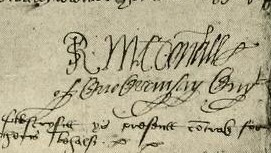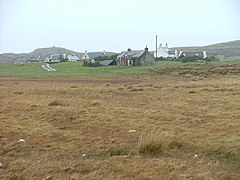
The Lord of the Isles or King of the Isles (Scottish Gaelic: Triath nan Eilean or Rìgh Innse Gall) is a title of Scottish nobility with historical roots that go back beyond the Kingdom of Scotland. It began with Somerled in the 12th century and thereafter the title was held by a series of his descendants, the Norse Gaels rulers of the Isle of Man and Argyll and the islands of Scotland in the Middle Ages. They wielded sea-power with fleets of galleys (birlinns). Although they were, at times, nominal vassals of the Kings of Norway, Ireland, or Scotland, the island chiefs remained functionally independent for many centuries. Their territory included much of Argyll, the Isles of Arran, Bute, Islay, the Isle of Man, Hebrides, Knoydart, Ardnamurchan, and the Kintyre peninsula. At their height they were the greatest landowners and most powerful lords after the Kings of England and Scotland.

Ardnamurchan is a 50-square-mile (130-square-kilometre) peninsula in the ward management area of Lochaber, Highland, Scotland, noted for being very unspoiled and undisturbed. Its remoteness is accentuated by the main access route being a single track road for much of its length. The most westerly point of mainland Great Britain, Corrachadh Mòr, is in Ardnamurchan.
Alasdair is a Scottish Gaelic given name. The name is a Gaelic form of Alexander which has long been a popular name in Scotland. The personal name Alasdair is often Anglicised as Alistair, Alastair, and Alaster.

Clan MacLean is a Highlands Scottish clan. They are one of the oldest clans in the Highlands and owned large tracts of land in Argyll as well as the Inner Hebrides. Many early MacLeans became famous for their honour, strength and courage in battle. They were involved in clan skirmishes with the Mackinnons, Camerons, MacDonalds and Campbells, as well as all of the Jacobite risings.
Alasdair mac Mhaighstir Alasdair, legal name Alexander MacDonald, was a Scottish war poet, satirist, lexicographer, political writer and memoirist. He was one of the most famous Scottish Gaelic Bards of the 18th century. He served as a Jacobite military officer and Gaelic tutor to Prince Charles Edward Stuart.

Mingary Castle, also known as Mingarry Castle, is a castle situated one mile southeast of the small village of Kilchoan in Lochaber, Scotland. Nestled on ridge of rock overlooking the sea, it was considered a strategically important site in terms of communication with overseas areas and as an entranceway to the Sound of Mull. Mingary is roughly hexagonal in shape with nine-foot-thick walls, thicker on the seaward side. The remains of the castle are protected as a category A listed building.

Ardgour is an area of the Scottish Highlands on the western shore of Loch Linnhe. It lies north of the district of Morvern and east of the district of Sunart. Administratively it is now part of the ward management area of Lochaber, in Highland council area. It forms part of the traditional shire and current registration county of Argyll.

Acharacle is a village in Ardnamurchan, Lochaber, within the county of Argyll. It is in the Highland Council area of Scotland.

Portuairk is a crofting township, at the western end of the Ardnamurchan peninsula, Lochaber, Highland, Scotland.

Morvern, historically also spelt Morven, is a peninsula and traditional district in the Highlands, on the west coast of Scotland. It lies south of the districts of Ardgour and Sunart, and is bounded on the north by Loch Sunart and Glen Tarbert, on the south east by Loch Linnhe and on the south west by the Sound of Mull. The name is derived from the Gaelic A' Mhorbhairne. The highest point is the summit of the Corbett Creach Bheinn which reaches 853 metres (2,799 ft) in elevation.

Clan MacDonald of Clanranald, also known as Clan Ranald or Clan Ronald, is a Highland Scottish clan and a branch of Clan Donald, one of the largest Scottish clans. The founder of the MacDonalds of Clanranald is Reginald, 4th great-grandson of Somerled. The MacDonalds of Clanranald descend from Reginald's elder son Allan and the MacDonells of Glengarry descend from his younger son Donald. The clan chief of the MacDonalds of Clanranald is traditionally designated as The Captain of Clanranald and today both the chief and clan are recognised by the Lord Lyon King of Arms, the heraldic judge in Scotland.

Clan MacDonald of Dunnyveg, also known as Clan Donald South, Clan Iain Mor, Clan MacDonald of Islay and Kintyre, MacDonalds of the Glens (Antrim) and sometimes referred to as MacDonnells, is a Scottish clan and a branch of Clan Donald. The founder of the MacDonalds of Dunnyveg is Eòin Mòr Tànaiste Mac Dhòmhnaill, a son of Iain Mic Dhòmhnaill and Margaret Stewart. Members of the Clan actually pronounced and spelled their name M'Connal due to the Gaelic pronunciation of the name Mac Domhnuill thus giving rise to the surname McConnell and its variants.

Kilmory is a small crofting (township) hamlet on the north coast of Ardnamurchan, western Scotland.

Breacleit is the central village on Great Bernera in the Outer Hebrides, Scotland. Breaclete is within the parish of Uig. Although the village name comes from a geographical feature rather than a steading it is generally believed to be an ancient settlement. The oldest building in the village is the thatched water mill by the shore of Loch Risay which was restored in the 1990s. It was formerly a tiny crofting and fishing settlement of just 12 crofts surrounding the natural harbour of Loch Beag but crofting has now ceased and holiday homes have taken over. The earliest clearly mapped reference is on Murdoch MacKenzie's first Admiralty chart surveyed in 1748. In 1851 J.M. MacKenzie, the Chamberlain to the estate owner Sir James Matheson, proposed that all the tenants of the village were to be evicted and sent to North America on the emigrant ship the SS Marquis of Stafford. This plan was not fully carried through however but it still had a great effect on the village leaving it with a population of just three families. This population was later supplemented through evictions elsewhere notably the clearances of Hacklete and Barragloum villages in the south of Great Bernera.
Eòrpa is long-running current affairs programme broadcast on BBC Alba. The series has been running since 1993 and has covered political and social issues affecting Europe and Europeans over that time including issues affecting the Western Isles. It is broadcast weekly in Scottish Gaelic with English subtitles. The programme has also been credited with awards, including Scottish BAFTAs. It is funded by the Gaelic Media Service and produced by BBC Gàidhlig. Eòrpa is shown on BBC Alba weekly and used to be shown on BBC Two Scotland until its closure in 2019 for the new BBC Scotland channel.
Alasdair Maclean (1926–1994) was a Scottish poet and writer, born in Glasgow.

Sir Lachlan Maclean, 1st Baronet of Morvern, the 17th Clan Chief of Clan Maclean. Lachlan was granted his Baronet title by Charles I and he became the Clan Chief on the death of his brother in 1626. He fought as a Royalist under James Graham, 1st Marquess of Montrose during the Wars of the Three Kingdoms at the Battle of Inverlochy, Battle of Auldearn and Battle of Kilsyth. From 1628 to 1633 he sat in the Parliament of Scotland as shire commissioner for Tarbert. From his rule onward, all Maclean clan chiefs are successive Baronets of Movern.
Lachlan Maclean, 6th Laird of Coll succeeded his father Hector to this title to lands on the Scottish island of Coll. He was succeeded by his son John at some point in the 17th century.
Colla MacDonnell was a son of Alexander MacDonnell, Lord of Islay and Kintyre (Cantire), and Catherine, daughter of the Lord of Ardnamurchan. He died at Kinbane Castle in 1558.













